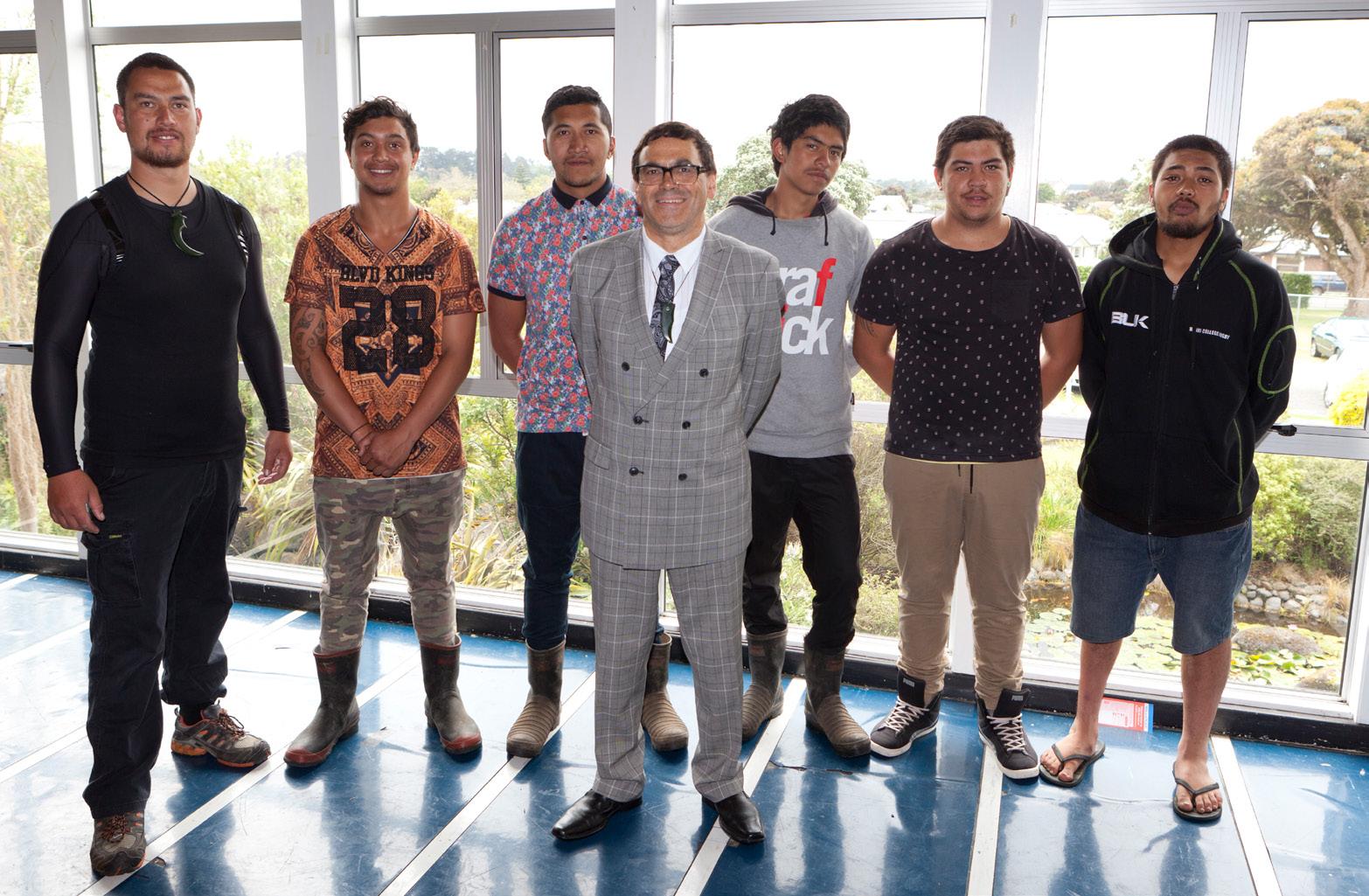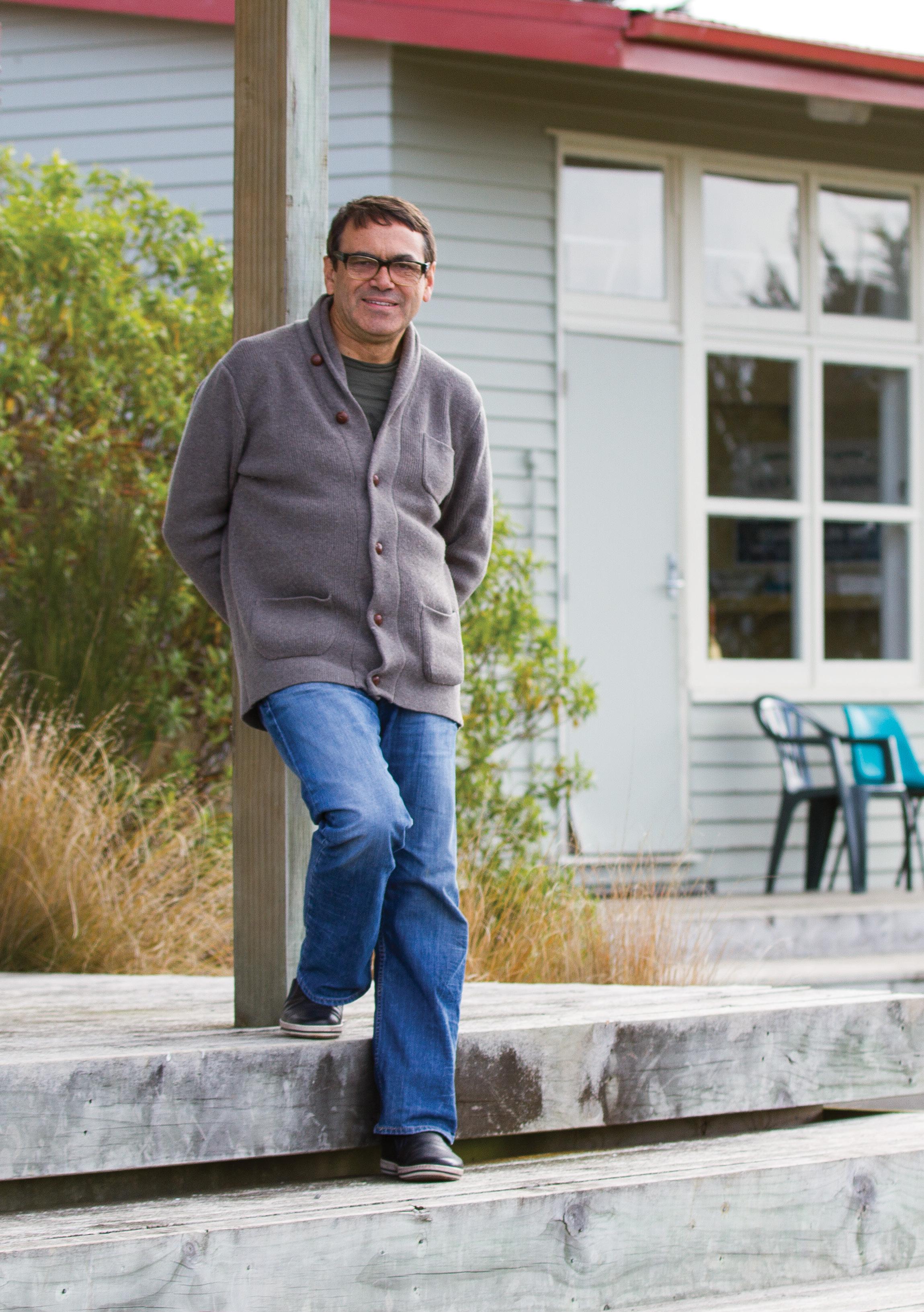
8 minute read
Passion and determination – the life of Toni Waho
The contribution that Toni Waho made to the Ātihau-Whanganui Incorporation, serving 12 years on the Board, is immeasurable. With his recent passing, AWHI Magazine pays tribute to the man he was and the life he lived, creating a legacy that will last for generations.
When Toni Waho knew something to be true, he was uncompromising, determined and passionate in his pursuit of it.
His belief in the power of te reo Māori to rebuild a culture and provide a future for those to come was absolute, and he dedicated his life to making his vision a reality.
Toni spoke with passion and humour of how he perceived te reo Māori contributed to building pathways at a Families Commission event in 2011, saying, “My past is my future - the past I yearn for will catapult Māori to a limitless fulfilment of potential beyond our wildest dreams.”
The son of Margaret and Edward Davis (Waho), Toni grew up with brothers Keri, Rick, and Mark, building a strong association to his Ngā Mōkai Papakāinga at Karioi. His penchant and talent for research and writing started young after he won a regional primary school speech competition in 1972. His essay ‘Why the Māori language should be taught in schools’, responded to a newspaper article he had read featuring Māori University students calling for a petition to go to parliament to make te reo Māori part of the education curriculum.

Despite his young zeal, he could not speak te reo Māori when he finished his education at Palmerston North Boys’ High School—just English and French.
A trip to British Columbia, Canada, as an exchange student, gave Toni the opportunity to meet and talk with Secwepemc, one of the country’s First Nations people, who he thought had very similar traits, personality and humour to his Māori family at home. “I could have been at the Pā. It was exactly the same except they had giant salmon there. But everything was the same, the bad jokes from the uncles, all of that kind of stuff,” he said of his time with them.
Toni returned to New Zealand for a short period before heading back to Canada to be a singer in a rock band called Castle. Ambitions of becoming a rockstar were forgotten when both of his grandfathers passed away and he wasn’t able return in time for their tangi. Realising it was too difficult to be so far away from his family, Toni returned to New Zealand and immediately enrolled at Victoria University to study law.
This decision was to be a seminal moment in Toni’s life as Ruka Broughton Snr was his reo lecturer. Ruka was passionate about the preservation of the language, and with his mentorship Toni’s commitment to te reo grew alongside his love for research and lobbying. These skills, honed during his time at university, were to hold him in good stead for the future leadership roles he was to fill.
“When we met, I was living in Palmerston North”, says Penny Poutu, Toni’s partner of 33 years and mother of his two children Hinurewa and Peehi. “He was in his third year of law on a Maori law scholarship, but he said to me, ‘I don’t think I am going to be the lawyer with a condominium in Hawaii.’”
“So, he changed tact, spending more time with his grandmother Hinurewa Whakapu, (also known as Oke Tumango), a native reo speaker who was living in Karioi and focused on learning his reo and the history of his family’s connection to the land.”
Whatarangi Murphy-Peehi, a long-standing Ātihau-Whanganui Incorporation trustee, remembers Toni during this time as a young man who often visited his parents, Robyn and Te Ua Murphy Peehi.
“He was around during the latter years with the Morikau Incorporation relationship where he would try to get a better understanding of what our earlier leaders, like my dad and Rangi Mete Kingi, were trying to achieve. The time he spent with my mother was really about learning the history, the stories,” he says.
“When he was elected to the Committee of Management, he certainly spoke up if he didn’t think things were going right. We were good mates and we got up to some antics, challenging each other, but I could rely on his advice especially when I had reports to present. He would help me articulate the information so I could get my message across to shareholders.”
Toni’s belief in the importance of te reo Māori meant that by the time he and Penny became parents, they had decided to not speak English to their babies.
“His te reo was better than mine,” says Penny. “So, I went back to work and he looked after Hinurewa, taking her with him to his part-time lecturing role at Massey University.”
“He was definitely breaking the mould back then as it was literally unheard of, but Toni went about being a young father with his natural enthusiasm.”
“And though the washing might be out on the line by ten in the morning, if the sun was shining he’d take her to the beach, and bugger the rest of the housework. That’s the sort of father he was.”
Both Toni and Penny would strengthen their commitment to their children’s reo education by establishing, with other members of the community, Te Kura Kaupapa Māori o Manawatū in Palmerston North in 1989. Te Kōhanga Reo o Mana Tamariki and Te Kura Kaupapa Māori o Mana Tamariki were established in the years that followed. Mana Tamariki has since grown to include a wharekura.

Top: Toni and his wife Penny (left) with their daughter Hinurewa at her graduation in 2015.
“It was a long drawn out battle to create that school, and ugly at times, but Toni’s legal training definitely came in handy to help navigate our way through government bureaucracy,” says Penny.
“He remembered there was a 1962 Māori Schools Act but he didn’t know if it was still alive, so he rang this lady at the Victoria University library and introduced himself.
She remembered him and dug it out for us and that became one of the tools we used in our campaign.
“It wasn’t surprising because Toni was a very memorable person, it does sadden me that our mokopuna won’t get to grow up with his presence.”

Above image: Ātihau board members and uri celebrate the opening of the Awhiwhenua whare. Overleaf: Toni at Ngā Mōkai Marae.
“Toni put his style into everything he was involved with,” says Mavis Mullins, Chair of Ātihau-Whanganui Incorporation. “He was a big part of our drive to invest in our own people, our rangatahi. He became our inaugural chair when we set up Te Āti Hau Trust and helped champion the importance of bringing our young ones back onto the whenua.”
Toni was actively involved in the establishment and operation of the Incorporation’s agribusiness training programme, Awhiwhenua, which is run in partnership with Land Based Training, until just few years ago.

Above image: Toni (front) with the Awhiwhenua cadets at the 2014 AGM.
Utilising Ngā Mōkai as the training base since 2010 was seen by Toni as a real celebration, not only of the hard work it had taken to rebuild the marae, but in demonstrating how a distribution back to shareholders is not all about pūtea, that it can be investment in the future on their behalf.
“We now have Awhiwhenua House which is not only functional but beautiful, because of Toni,” adds Mavis. “We used to have the graduation for the programme at Ngā Mōkai where it was intimate and a lovely place to be.
“I hope Toni will be proud that we are now holding the graduation at our annual general meeting so that our uri are acknowledged in front of around 700 shareholders.”
Toni’s daughter, language advocate Dr Hinurewa Poutu, says her connection with her family and marae are down to her father.
“Dad’s involvement with the ĀtihauWhanganui Inc was, to me, his expression of rangatiratanga,” says Hinurewa. “He was passionate about te reo and education and was often active outside of our rohe working. Peehi (her younger brother) and I mostly grew up in the Manawatū, but he ensured that we valued our whakapapa and connections to home.”
“I remember Ngā Mōkai being overrun with livestock running through the wharenui, but dad was determined to revive the Pā. That achievement now forms a part of his legacy in which I know I will take an active role.”
“Dad also coined the name AWHI which has grown to be an important brand for the incorporation, part of the tikanga and resources from the whenua that enable us as uri to survive.”
Hinurewa says it’s sad that the Ngāti Rangi treaty settlement negotiations around Te Kāhui Maunga were not resolved before her father’s untimely death. “One quality he really demonstrated in his lifetime was ‘mahia te mahi’,” she says.
We will give our last words in this tribute to Toni himself – speaking at that same Families Commission hui, he said;











